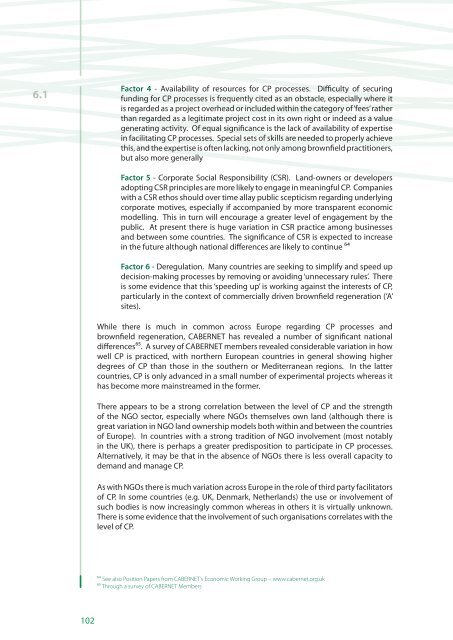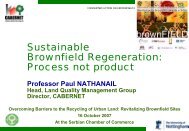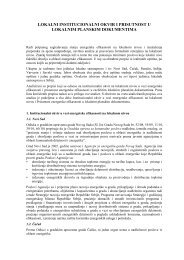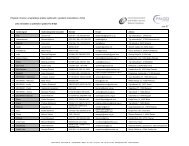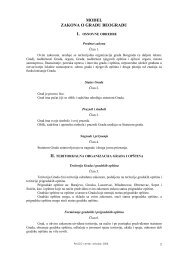Sustainable Brownfield Regeneration: CABERNET Network Report
Sustainable Brownfield Regeneration: CABERNET Network Report
Sustainable Brownfield Regeneration: CABERNET Network Report
Create successful ePaper yourself
Turn your PDF publications into a flip-book with our unique Google optimized e-Paper software.
6.1Factor 4 - Availability of resources for CP processes. Difficulty of securingfunding for CP processes is frequently cited as an obstacle, especially where itis regarded as a project overhead or included within the category of ‘fees’ ratherthan regarded as a legitimate project cost in its own right or indeed as a valuegenerating activity. Of equal significance is the lack of availability of expertisein facilitating CP processes. Special sets of skills are needed to properly achievethis, and the expertise is often lacking, not only among brownfield practitioners,but also more generallyFactor 5 - Corporate Social Responsibility (CSR). Land-owners or developersadopting CSR principles are more likely to engage in meaningful CP. Companieswith a CSR ethos should over time allay public scepticism regarding underlyingcorporate motives, especially if accompanied by more transparent economicmodelling. This in turn will encourage a greater level of engagement by thepublic. At present there is huge variation in CSR practice among businessesand between some countries. The significance of CSR is expected to increasein the future although national differences are likely to continue ⁶⁴Factor 6 - Deregulation. Many countries are seeking to simplify and speed updecision-making processes by removing or avoiding ‘unnecessary rules’. Thereis some evidence that this ‘speeding up’ is working against the interests of CP,particularly in the context of commercially driven brownfield regeneration (‘A’sites).While there is much in common across Europe regarding CP processes andbrownfield regeneration, <strong>CABERNET</strong> has revealed a number of significant nationaldifferences⁶⁵. A survey of <strong>CABERNET</strong> members revealed considerable variation in howwell CP is practiced, with northern European countries in general showing higherdegrees of CP than those in the southern or Mediterranean regions. In the lattercountries, CP is only advanced in a small number of experimental projects whereas ithas become more mainstreamed in the former.There appears to be a strong correlation between the level of CP and the strengthof the NGO sector, especially where NGOs themselves own land (although there isgreat variation in NGO land ownership models both within and between the countriesof Europe). In countries with a strong tradition of NGO involvement (most notablyin the UK), there is perhaps a greater predisposition to participate in CP processes.Alternatively, it may be that in the absence of NGOs there is less overall capacity todemand and manage CP.As with NGOs there is much variation across Europe in the role of third party facilitatorsof CP. In some countries (e.g. UK, Denmark, Netherlands) the use or involvement ofsuch bodies is now increasingly common whereas in others it is virtually unknown.There is some evidence that the involvement of such organisations correlates with thelevel of CP.⁶⁴ See also Position Papers from <strong>CABERNET</strong>’s Economic Working Group – www.cabernet.org.uk⁶⁵ Through a survey of <strong>CABERNET</strong> Members102


